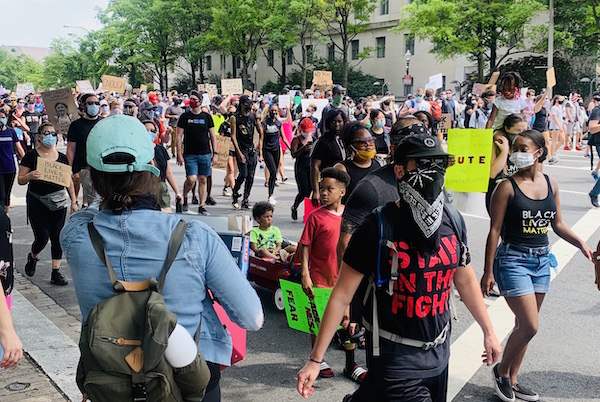Jan 13, 2026 2:09 PM
More Trump-Kennedy Center Cancellations
The fallout from the renaming of the John F. Kennedy Center for the Performing Arts to include President Donald…

Protesters march June 6 in Washington, D.C., following the police killing of George Floyd.
(Photo: John Murph)Jazz singer and activist Aaron Myers was among the demonstrators who gathered to protest at Lafayette Square on June 1 in Washington, D.C., following the police slaying of George Floyd.
Myers said he was in one of the guard facilities across the street from the White House in the park when he realized that law enforcement had begun firing rubber bullets and tear gas at peaceful protesters. The District’s mayor, Muriel E. Bowser (who since has renamed the park Black Lives Matter Plaza), had issued a 7 p.m. curfew after some of the previous protests resulted in vandalism and confrontations with police.
It was still the afternoon.
“I was in that burned-out building, trying to get some footage of the protest,” Myers recalled. “As I walked out of that bunker, out of the corner of my right eye, I saw people running. That’s when I could smell the gas; I started coughing and crying. It was pure shock at first. Usually, when that measure is used, it’s accompanied by some action that precipitated that. There was no just cause of why the gassing should have started.”
Soon after, armed security personnel from various branches of local and federal agencies cleared a path through the park for President Donald Trump to walk from the White House through the park to St. John’s Episcopal Church for a photo-op, where he proceeded to pose with a Bible.
“In that action, the president served as the largest threat to public health, regarding the protesters in that moment. I was dumbfounded,” said Myers, who’s the co-founder of Capitol Hill Jazz Foundation, a nonprofit aiming to use jazz as a tool for economic development. “After my initial shock, my next immediate reaction was concern. I knew in that moment that we all had been exposed. The protesters had already made the calculated risk of being out there with COVID-19. I became angry, because it was clear that the president does not care about Black people.”
For a time, it seemed as though the coronavirus pandemic was going to completely dominate the news in 2020. And it did, until the Black Lives Matter movement ignited protests around the world following Floyd’s May 25 killing in Minneapolis by city police.
After being called to a convenience store on suspicion of Floyd passing a counterfeit 20-dollar bill, video shows him struggling beneath the weight of Officer Derek Chauvin’s knee for about eight minutes, calling out for his mother and telling police that he couldn’t breathe. The Minneapolis Police Department fired all four officers involved in the killing; Chauvin was charged with second-degree murder, third-degree murder and second-degree manslaughter. The other officers all are charged with aiding and abetting two of those alleged crimes.
Ever since Alicia Garza, Patrisse Cullors and Opal Tometi started the Black Lives Matter movement in July 2013 as a response to George Zimmerman’s acquittal in the slaying of Trayvon Martin, jazz musicians like Robert Glasper, Ben Williams, Ambrose Akinmusire, Terri Lyne Carrington, Christian Scott aTunde Adjuah and Matana Roberts have contributed to its soundtrack.
Despite safety concerns amid the pandemic, many performers still have decided to engage in a range of social activism, including bassist Luke Stewart, a cofounder of the D.C. nonprofit presenting organization CapitalBop, which often marries jazz performance and activism.
“I was pretty much at a protest in some fashion every day for an entire week,” Stewart said about the days following Floyd’s killing. “But I was on the periphery, because I’m still very much concerned with staying healthy with the COVID-19 situation. Still, I’m also drawn to the fact that these protests are happening in Washington, D.C.—in my own backyard. I feel like it’s my responsibility to at least be a witness.”

Belá Fleck during an interview with Fredrika Whitfield on CNN.
Jan 13, 2026 2:09 PM
The fallout from the renaming of the John F. Kennedy Center for the Performing Arts to include President Donald…

Peplowski first came to prominence in legacy swing bands, including the final iteration of the Benny Goodman Orchestra, before beginning a solo career in the late 1980s.
Feb 3, 2026 12:10 AM
Ken Peplowski, a clarinetist and tenor saxophonist who straddled the worlds of traditional and modern jazz, died Feb. 2…

The success of Oregon’s first album, 1971’s Music Of Another Present Era, allowed Towner to establish a solo career.
Jan 19, 2026 5:02 PM
Ralph Towner, a guitarist and composer who blended multiple genres, including jazz — and throughout them all remained…

Rico’s Anti-Microbial Instrument Swab
Jan 19, 2026 2:48 PM
With this year’s NAMM Show right around the corner, we can look forward to plenty of new and innovative instruments…

Richie Beirach was particularly renowned for his approach to chromatic harmony, which he used to improvise reharmonizations of originals and standards.
Jan 27, 2026 11:19 AM
Richie Beirach, a pianist and composer who channeled a knowledge of modern classical music into his jazz practice,…